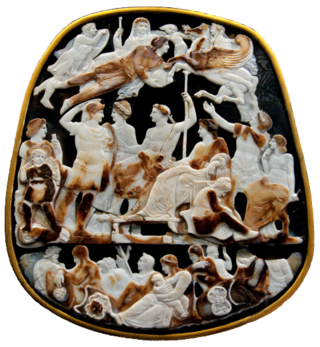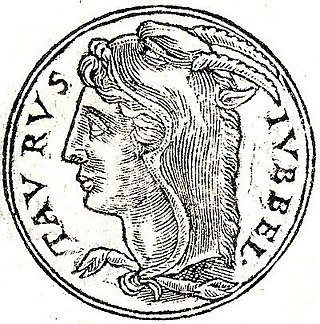Related Research Articles

The Julio-Claudian dynasty comprised the first five Roman emperors: Augustus, Tiberius, Caligula, Claudius, and Nero.
Marcus Valerius Messalla Corvinus was a Roman general, author, and patron of literature and art.
Gaius Asinius Gallus was a Roman senator, son of Gaius Asinius Pollio and Quinctia. He was the second husband of Vipsania, eldest daughter of Marcus Agrippa and first wife of Tiberius, who ultimately imprisoned him.

Vipsania Agrippina was the first wife of the Emperor Tiberius. She was the daughter of Marcus Vipsanius Agrippa and Attica, thus a granddaughter of Titus Pomponius Atticus, the best friend of Cicero.

Statilia Messalina was a Roman patrician woman, a Roman Empress and third wife to Roman Emperor Nero.
Marcus Valerius Messalla Messallinus was a Roman senator who was elected consul for 3 BC.
Gaius Sallustius Passienus Crispus was a prominent figure in the Roman Empire during the first century. He held the consulship twice, and was stepfather of the future emperor Nero.
Pomponia Graecina was a noble Roman woman of the 1st century who was related to the Julio-Claudian dynasty. She was the wife of Aulus Plautius, the general who led the Roman conquest of Britain in 43 AD, and was renowned as one of the few people who dared to publicly mourn the death of a kinswoman killed by the Imperial family. It has been speculated that she was an early Christian. She is identified by some as Lucina or Lucy, a saint honoured by the Roman Catholic Church.
Marcus Valerius Messalla Corvinus was a Roman Senator who lived in the Roman Empire in the 1st century. He might have been the brother of empress Messalina.
Marcus Vinicius was twice Roman consul and, as husband of Julia Livilla, grandson-in-law (progener) of the emperor Tiberius. He was the son and grandson of two consuls, Publius Vinicius and Marcus Vinicius.
Gaius Asinius Pollio was a Roman senator and orator active during the Principate. He was ordinary consul for 23 with Gaius Antistius Vetus as his colleague. He was the oldest son of Gaius Asinius Gallus; his brother was Marcus Asinius Agrippa, consul in 25. Pollio's mother was Vipsania Agrippina. Through her, he was the half-brother of the younger Drusus.
Marcus Aurelius Cotta Maximus Messalinus was a Roman Senator who was a friend of the first two Roman emperors Augustus and Tiberius.

Titus Statilius Taurus was the name of a line of Roman senators. The first known and most important of these was a Roman general and two-time consul prominent during the Triumviral and Augustan periods. The other men who bore this name were his descendants.

The gens Antonia was a Roman family of great antiquity, with both patrician and plebeian branches. The first of the gens to achieve prominence was Titus Antonius Merenda, one of the second group of Decemviri called, in 450 BC, to help draft what became the Law of the Twelve Tables. The most prominent member of the gens was Marcus Antonius.
The gens Asinia was a plebeian family at ancient Rome, which rose to prominence during the first century BC. The first member of this gens mentioned in history is Herius Asinius, commander of the Marrucini during the Social War. The Asinii probably obtained Roman citizenship in the aftermath of this conflict, as they are mentioned at Rome within a generation, and Gaius Asinius Pollio obtained the consulship in 40 BC.
Decimus Valerius Taurus Catullus Messallinus Asiaticus was a member of the Arval Brethren who lived in the second half of 1st century and first half of 2nd century.
Servius Asinius Celer was a Roman senator active during the Principate. He was suffect consul in the second half of the year 38 with Sextus Nonius Quinctilianus as his colleague.

The gens Statilia was a plebeian family of Lucanian origin at ancient Rome. Members of this gens are first mentioned in the third century BC, when one of them led the Lucanian assault on the city of Thurii, and another commanded an allied cavalry troop during the Second Punic War; but at Rome the Statilii first come to attention in the time of Cicero, at which point they held equestrian rank. The first of the family to attain the consulship was Titus Statilius Taurus in 37 BC, and his descendants continued to fill the highest offices of the Roman state until the time of Marcus Aurelius.
References
- ↑ Suetonius; Donna W. Hurley, Divvs Clavdivs (2001), p. 112
- ↑ Anthony A. Barrett, Agrippina: Sex, Power and Politics in the Early Empire, (London: Batsford, 1996), p. 104 Google Books
- ↑ Marjorie and Benjamin Lightman, A to Z of Ancient Greek and Roman Women (Facts on File, 2008), p. 303 Google Books